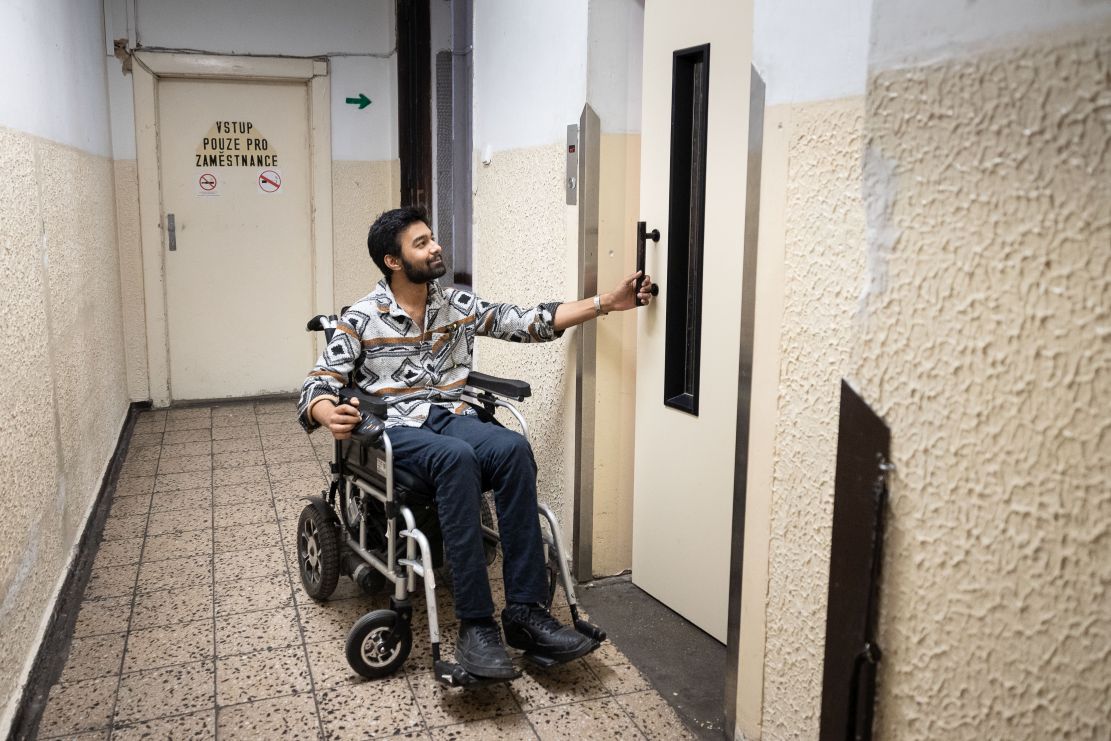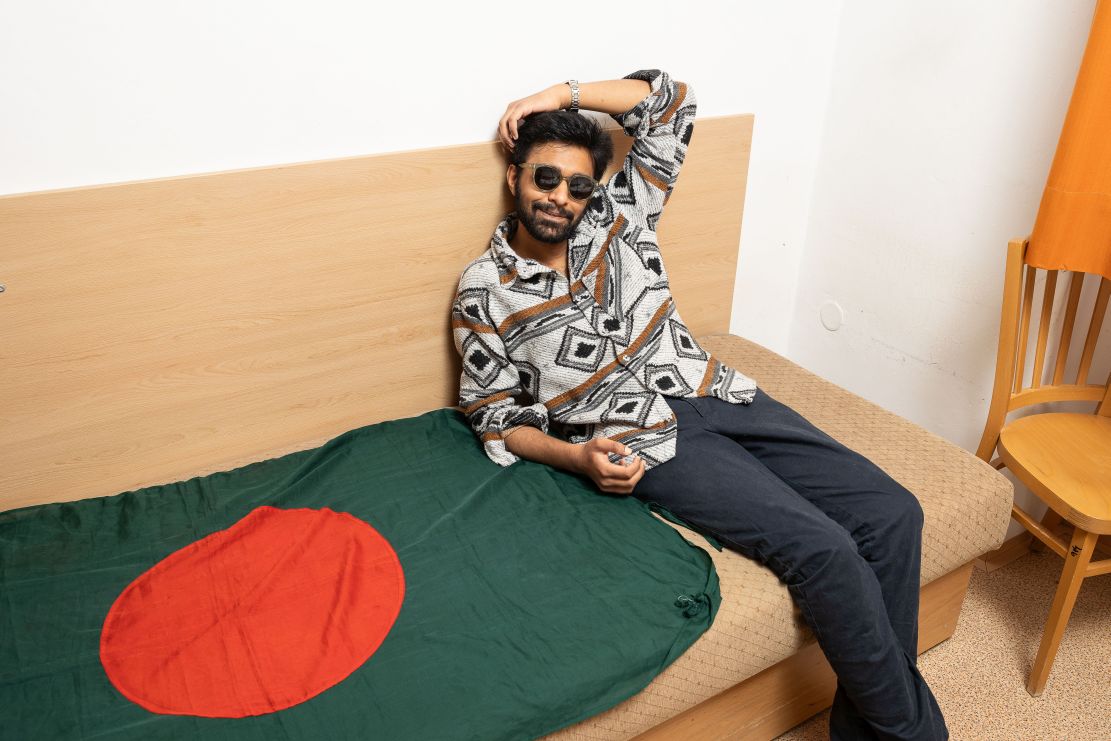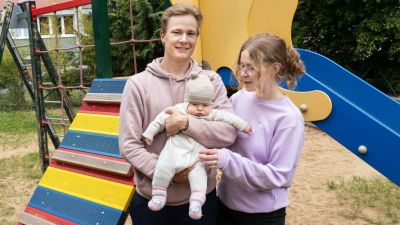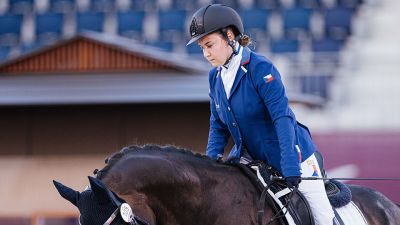Charles University is committed to making international opportunities accessible to all students, including those with disabilities. As the experience of Bangladesh-born researcher and author Shakil Reja Efti during his Erasmus+ stay shows, important steps have been taken — but challenges remain. With humour and perseverance, Efti’s story as a wheelchair user highlights progress but also areas where significant improvement is still needed. Better access to the dorm laundry, to canteens, in some cases to classes themselves (at a facility where the nearby metro stop lacks an elevator). In this sense, Shakil was a trailblazer and his journey was not without road bumps. He discusses what worked and what didn't, for anyone considering a stay of their own.
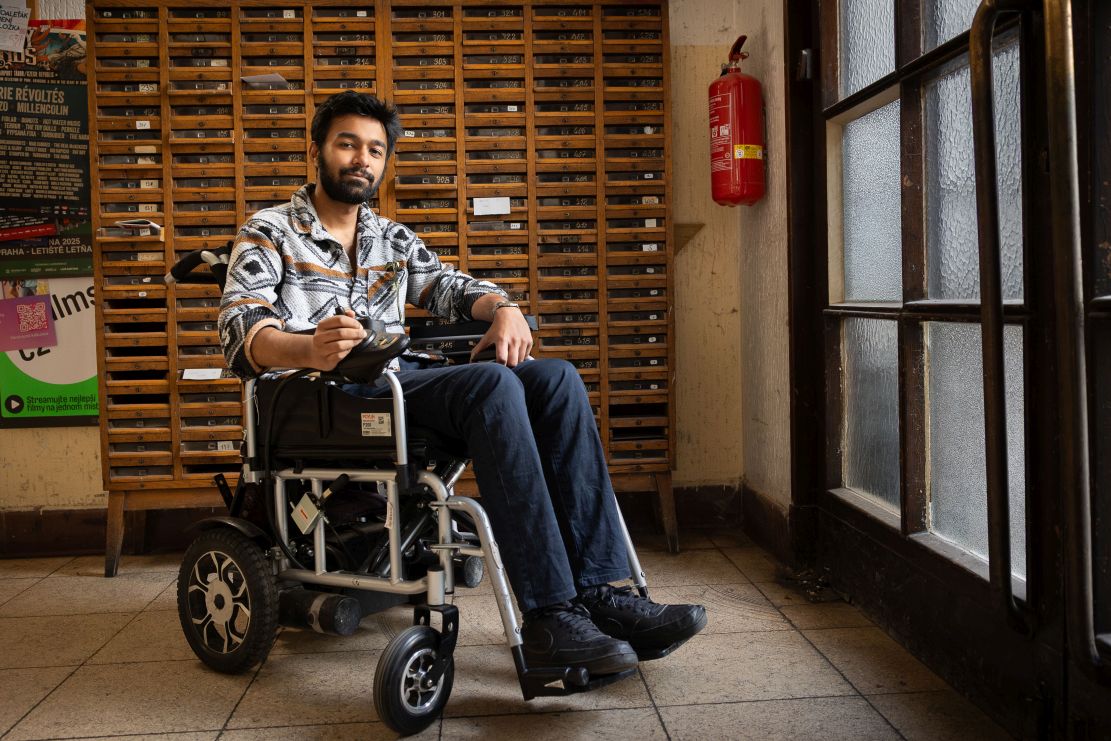
Master's student, researcher and author Shakil Reja Efti during his Erasmus+ stay at Charles University in Prague.
Why did you choose Charles University for your Erasmus+ mobility?
I chose Charles University because I’m originally from Bangladesh, Bengali by ethnicity, and I’m a writer of travelogues. But there’s no known Bengali literature about Prague, so I wanted to be the first to write about it. I’m also a fan of Kafka, so Prague and the city’s connection to Kafka were also attractive to me. Charles University, as one of the oldest universities in the world, was intriguing: the campus is scattered throughout the city, so I consider the entire Prague area part of the university experience.
Was this your first Erasmus+ stay?
Yes. Originally, I also had a chance to come to Charles University during my undergrad, but back then I wasn’t confident because at the time I was new to using a wheelchair independently (following illness and later, surgery). Since then, things have changed: I’ve been to the United Kingdom and other places for academic conferences, which boosted my confidence to try Prague. It wasn’t easy: initially, it was difficult to find enough online information about Charles University accessibility, so I contacted the faculty coordinator, who assured me the school could accommodate me. I couldn’t find any previous wheelchair user interviews to reference, but I decided to try, and I’m happy I did. I am happy with the experience now, but there were some difficulties that had to be overcome regarding the accomodation, access to canteens, and wider access in Prague, outside the university. It wasn't easy and I think deeper communication in advance will be a big help for anyone following my path.
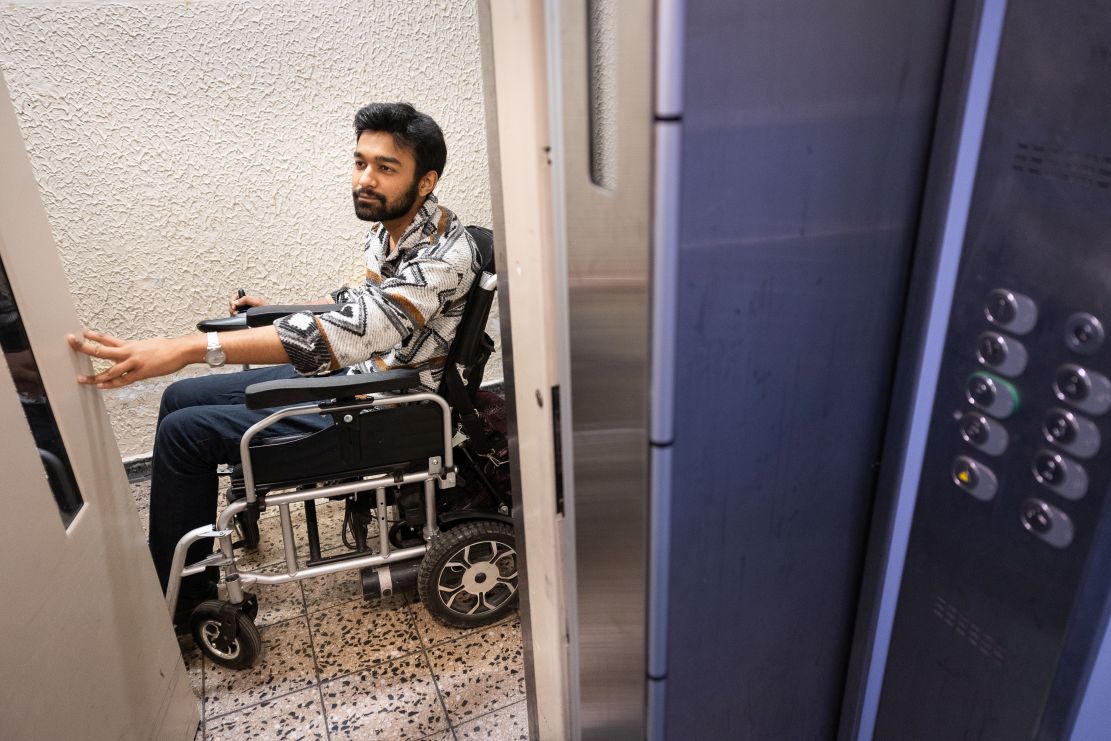
At the dormitory: staff were always friendly and helpful but the elevator was very small for someone in a wheelchair, requiring extra effort to use.
Did you have concerns beforehand?
The dormitory was my biggest concern. Prague is a very old city: beautiful but challenging for wheelchair users because of things like cobblestone streets. I’m currently at one of the oldest dormitories at Charles University, dating back to 1880. The lifts are narrow, so I have to remove my wheelchair leg rests to fit. The campus is scattered, so I had to check with the coordinator about class locations because some buildings are inaccessible. The metro station nearest one of the buildings, for example, has no lift, which prevented me from attending certain classes. I prefer public transport, but the campus accessibility sort of counts on wheelchair users having personal cars. These cultural differences caused some inconvenience, but I learned to adapt and find solutions.
At your home university in Istanbul, Turkey, did you receive any support or information for financial or mobility assistance? How does that compare to support at Charles University?
My home university is not accustomed to wheelchair users going abroad. I might be the first with such needs in their Erasmus+ programme. I learned about additional European Commission support from Charles University, which my home university initially didn’t know about. They researched and are now better informed. Being the first is always hard, but hopefully it will help future students with special needs.
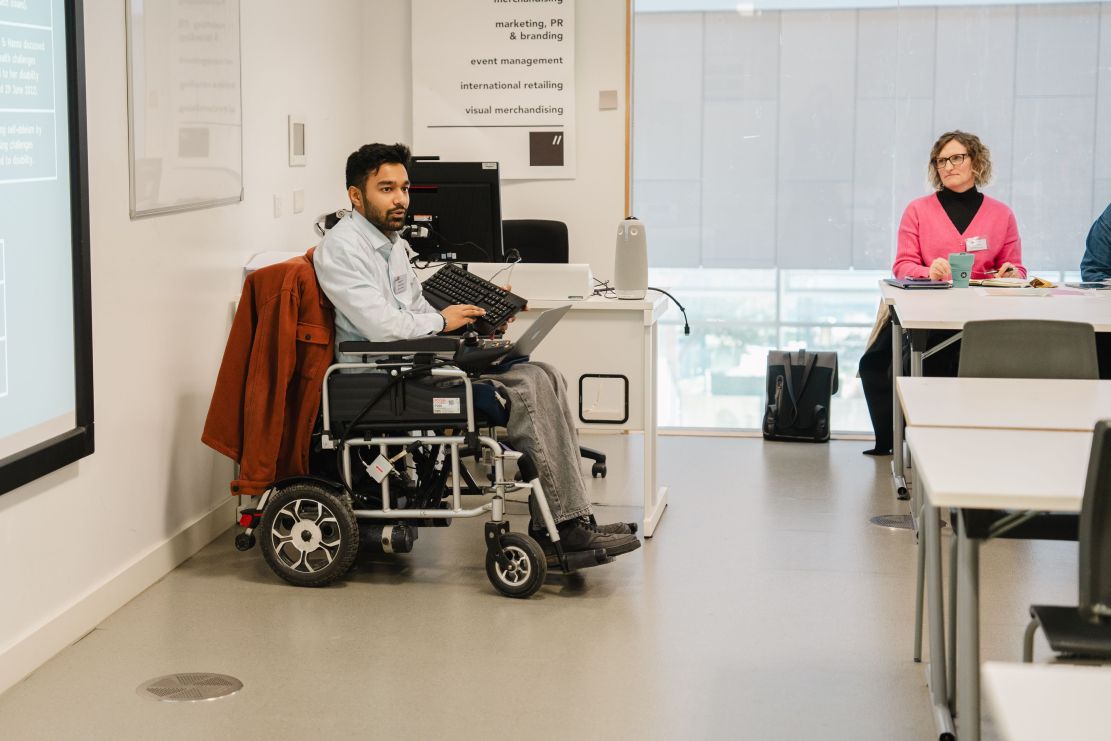
The student, presenting his findings at an international academic conference at Birmingham City University, England. Used with permission.
You travelled alone from Istanbul to Prague in winter. How did you manage?
It was a terrible time weather-wise, but thanks to the university office and the Student Buddy programme, I had a lot of help. My student buddy, an undergrad, even stayed with me the first night to assist me. I’m very thankful. It’s hard being the first, but it’s also a great adventure.
How did you find your student buddy?
Mine was assigned through a university system where Erasmus students sign up and get paired with a buddy. Regarding other Erasmus students, I met some through the Erasmus Student Network. However, most events happen in pubs that are not wheelchair accessible, which limits my participation. I suggested they indicate accessibility in event descriptions to avoid wasting time on inaccessible events. I think they should do that in the future as it makes a big difference.
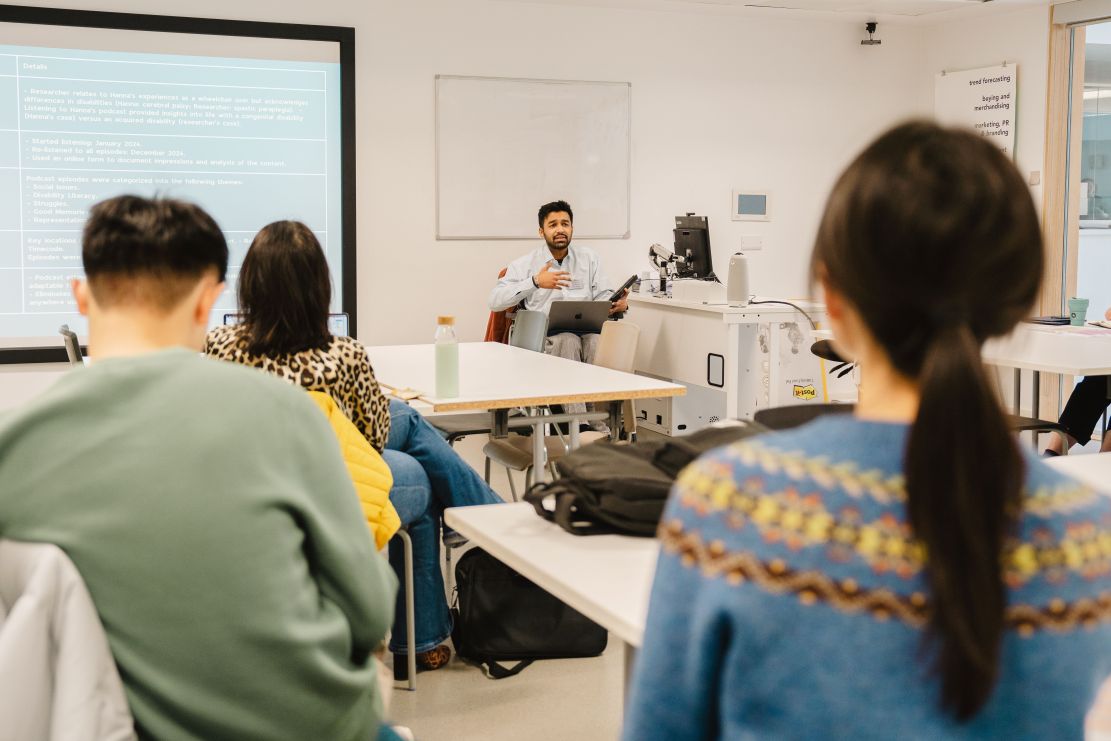
Academic conference at Birmingham City University, England. Used with permission.
Did you eat at any of the canteens at Charles University? Did you try Czech food?
So, one thing about the first dorm I was housed at, was that it was in Prague 10. The Czech restaurants around there were really wonderful, and I tried delicious Czech cuisine—I really loved it. But regarding the dormitory I live in now, the nearby canteen is not wheelchair accessible. They tried to make it accessible for me, like they wanted to create a way in through the back door, but it didn’t quite work because the key didn’t work. It didn't work. So I stopped complaining and just went there once. It was not a good experience, so I didn’t go again. Usually, I just cook Bengali food in my kitchen. I didn’t try other canteens. For me, Charles University means mainly the Hollar building (for classes) that we are in now.
You also cooperated with the Carolina Centre… My colleagues there focus on students with special needs. Are you still in touch with them?
The Carolina Centre is a wonderful place. For example, I needed a walker and a manual wheelchair, and they asked about my requirements. I told them and they arranged everything. They coordinated with the dormitory I live in and solved many issues there, like the laundry, which was initially not accessible. They built a ramp for me to enter the laundry. Charles University did its best to make my stay as comfortable as possible.
One thought I wanted to share: the Faculty of Social Sciences knew my condition and we communicated by email. But maybe a Zoom call with me before I came could have helped. I think I’m the only wheelchair student who came, so they could have arranged it easily. Maybe in the future, any wheelchair student or student with a disability could have a Zoom call before arrival or be connected with the Carolina Centre earlier. That would make things easier for future students. A more personal, individual approach would be great rather than group messages or email-only communication.
Regarding your studies, you mentioned you are largely limited to the Hollar building, which is home to the Faculty of Social Sciences. How do you enjoy your studies? You said you’re writing your Master’s thesis, but did you attend unrelated courses as well?
It’s very dynamic and I really liked it. I took four courses with professors from four different parts of Europe, which I really appreciate. The professors come from diverse backgrounds, and their research topics are current and very interesting.
For example, I was recently in a class called Current Issues in Digital Media Studies. It was wonderful. We talked about AI, and I gave a presentation on AI bias affecting disabled individuals. Disabled people face challenges everywhere, even in regular life, and AI and digital platforms present a different set of issues. It’s a very dynamic environment, and I really enjoyed it.
Are there more Czech students or international students in your classes? Can you compare, or do you have information?
I see a lot of international students, but also Czech students. It’s a mixture from different parts. The professors are from different places, and the students are as well. It’s a very multicultural environment, which I truly appreciate and enjoy. Sometimes in class, we have cultural presentations, and teachers ask us to talk about our home countries. It’s complicated for me because I’m not sure if I should talk about Turkey first or Bangladesh. Professors usually say Bangladesh would be more interesting because many students come from Turkey, but not many from Bangladesh. So I talk about my homeland, giving them a different perspective of that part of the world. I was glad to contribute to the multicultural environment of Charles University during these six months.
What’s next in terms of your career?
I am currently focused on academia: I'm trying to produce research papers, and all I want to do is do my PhD after that, but I definitely want to keep writing. I have already published three books in Bangladesh. I want to publish more in the future, and I'm equally interested in fiction and non-fiction. I'm currently working on a novel, and I'm writing a memoir as well. I love to write about my experiences as I travel to different places. And recently, my academic interest has also been disability studies.
Can you share your biggest challenge?
In the beginning, I complained, but I’m lucky because I experienced life both with and without disability. I’ve been disabled for four years now; before that, I could walk. When I started using a wheelchair and visiting Bangladesh, I complained at first, but later I got used to it. That’s how Bangladesh is. At one point, I stopped complaining.
Istanbul is also an old city, and Istanbul University, established in 1453, is the oldest university in Turkey. They’re also trying to make the environment and infrastructure accessible, like Charles University is. So I can’t really remember the difficulties. I focus on positive aspects. The city here is compact, not too big, and I can go anywhere I need to. I can take accessible trams or buses. The dormitory is centrally located, which gives me the chance to explore Prague.
It’s quite near the astronomical clock and all the tourist spots, including Kafka’s rotating head (outside Quadrio, by renowned Czech artist David Černý)—such an awesome piece of culture. There’s also Tesco, where I get groceries every week before coming back to my dorm. People here are really nice—always smiling and full of good energy. I would love to learn Czech, and I wish people would push me to learn it, but since most people know English, I don’t really need to. Another thing I find nice is that the Czech language sounds very poetic. When I use public transport and hear announcements, like “Národní třída,” the way it’s pronounced is poetic and soothing.
Every city has its own melody and sound. Dhaka, the capital of Bangladesh, has its chaotic music; Prague has a soothing one; Istanbul has a historical feel. I’m enjoying my time here. One of my goals was to get to know Prague’s music and atmosphere, and over the past four months, I feel I’ve had a good conversation with Prague.
What will you miss the most about the capital when you go back to Istanbul - or to your homeland?
One thing that I'll miss about Prague is the silence. It's such a silent city to me, because Bangladesh is quite chaotic. 170 million people live there, so it's people everywhere. By contrast, where I’ve been living, the room in the dorm has a very high ceiling and it's a very spacious place. And when it's night, or when it's evening, it's super silent and it feels like I'm in the set of some horror film. And that's when I'm like, okay, sometimes I'm really afraid at midnight, and I'm like, ‘Are there any ghosts? Is there anyone who is watching on me?’ Then I remember: Most people in Prague, I have heard, are atheists. They’re not quite believers. What would a ghost do in a country of atheists?! Yeah, so ghosts shouldn't be here. Ghosts are in India, where people like to worship them; ghosts here would feel neglected! As in, 'No one believes in me!' So yeah, that's a funny thing. My experience with ghosts and the silence is what I’ll miss.
| If you are considering Erasmus+... |
|
Charles University staff is here to help. If you’re planning to participate in Erasmus+ and have special needs, please reach out to the Erasmus+ Department first to discuss how the dept. and related services can support you during your stay.
|


